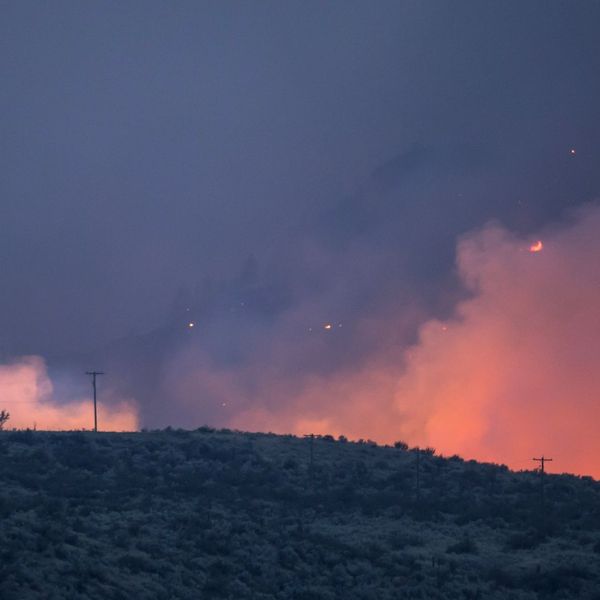The attorney for Chevron Oil was attempting a classic bit of courtroom performance: Offer a stunning admission -- then make a protest of innocence.
"Chevron accepts the scientific consensus regarding climate change," Theodore J. Boutrous Jr., an attorney for the California-based oil giant, said last month at the Federal District Courthouse in San Francisco. Then he dodged blame, telling the court that it's not energy companies like Chevron driving global warming, but "how people are leading their lives."
That scene encapsulates the central argument coming soon to courtrooms across the country: Who is responsible for the destructive effects of climate change -- the hurricanes, droughts, fires and rising seas? Is it all of us? Or the companies that extract refine and sell fossil fuels?
In the landmark cases now in federal court, eight California cities and counties are suing to make Chevron, ExxonMobil, Shell and other companies pay for some of the tens of millions of dollars local governments must spend to prepare for rising sea levels. New York City filed a similar suit in January, arguing that "a corporation that makes a product causing severe harm when used exactly as intended should shoulder the costs of abating that harm." Last Tuesday, the city of Boulder and two Colorado counties sued ExxonMobil and Suncor (the biggest Canadian oil company) to recover costs stemming from extreme flooding, more frequent fires, and declining snowpack. Attorneys hint that more such lawsuits are coming.
How the courts decide to handle these various lawsuits will play a critical role in whether we, as a society, are able to hold fossil fuel companies accountable for knowingly wreaking havoc on Earth's entire atmosphere.
Like other attempts to remedy historical wrongs -- reparations to African American descendants of slaves being the best known -- climate litigation is bedeviled by the immensity of the injustices involved. "Just as the problems of climate change overwhelm our cognitive and [emotional] systems ... they also swamp the machinery of morality," Dale Jamieson, a philosopher of environmental ethics, has written.
Part of the problem is time. The violent weather patterns we are experiencing now are the result of carbon emissions from decades ago. Even if we stop emitting all greenhouse gases today, climate change will persist for generations. In sum, many of the perpetrators are dead, and the majority of those who will suffer most aren't yet born.
Then there's the issue of space. Every transatlantic flight from New York to London contributes, in some small measure, to record-breaking temperatures in Australia or a drought in the Amazon. So much distance lies between cause and effect that it's hard to locate blame.
Finally, there's the complication of scope. We are, each of us, complicit to a degree every time we fire up the car's engine or jet off to a faraway place.
Still, it's a myth that all of us are equally liable for the ongoing disasters wrought by climate change. Oil and energy companies, through their actions and inaction, have knowingly fueled the destruction of Earth's essential life system for decades.
Unsurprisingly, the defendants see it differently. In response to the raft of lawsuits, BP's chief executive, Bob Dudley, swatted away any analogy to the Big Tobacco lawsuit, in which dozens of state attorneys general charged that cigarette makers had misled the public and were responsible for taxpayer-borne medical costs. "People don't need to smoke cigarettes," Dudley said earlier this year, "but they have needed energy for many decades." At some level, oil executives know a reckoning is coming, so they seek to dilute their responsibility with every gallon of fuel they sell.
A fair reading of history would conclude that the public at large has known about the dangers of our daily energy consumption at least since 1992, when the UN Framework Convention on Climate Change was adopted. From that point on, human morality demanded that we each take steps to reduce our energy consumption and therefore carbon emissions: go by bike rather than car, forgo the steak in favor of the vegetarian meal, have fewer children.
The controlling ethic of energy companies, by contrast, is the enrichment of shareholders. Confronted by the science of climate change, they went into profiteering mode.
The leadership of Big Oil knew about the dangers of global warming long before most of us. In a 1980 presentation to members of the American Petroleum Institute, a scientist warned that a global temperature rise of 2.5degC would likely have "major economic consequences" and that further rises would likely produce "globally catastrophic effects."
Yet instead of sounding the alarm, or even just sharing their findings with the government and the public, major oil corporations began a well-orchestrated campaign of deception. A memo circulated among API members in 1998 -- six years after the first UN Climate pact -- declared that "victory" would be achieved when... "average citizens 'understand' (recognize) the uncertainties in climate science." Everything went according to plan. Between 2006 and 2016, the percentage of Americans who believed that humans were responsible for global warming went down, even as scientists' confidence in their warnings increased. Meanwhile, in the last 20 years, ExxonMobil routinely broke U.S. records for corporate earnings.
The fossil fuel giants possessed the early scientific awareness, the economic might, and the political influence to shift the direction of human affairs and avoid climate chaos. They chose not to.
Even if the pending cases succeed, the question of climate restitution may well be too large for the courtroom, the damages too vast for any single judge or jury to decide. Tort law alone isn't going to save the planet.
Some kind of a reckoning must be made, and the courts are, for now, the best venue. But climate justice is ultimately a political problem. After all, we are not merely consumers seeking compensation for a defective product. We are citizens insisting that impunity is unacceptable in a republic governed by the rule of law.



